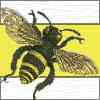
Saturday, December 27, 2008
Tuesday, November 25, 2008
The Gorilla in the Hive - CCD
At a recent meeting of the local beekeepers association there was a heated exchange about the advice a beekeeper had given to the resident of a nearby town. The aluminum siding on the man's home was filled with thousands of bees. He had contacted the association to get help. After assessing the situation, determining they weren't honeybees and attempting to relocate them, the beekeeper finally advised him he should contact an exterminator. There were outraged exclamations throughout the room, "We should never tell anyone to kill bees!" Then a calm voice from the back of the room commented, "Yeah, put 'em in a hive, they'll die soon enough." The room grew quiet.
CCD is a real concern to the hobbyist and commercial beekeeper alike. Every beekeeper anticipates a certain percentage of loss each year for various reasons. But CCD is an unusual and worldwide threat . Every local meeting begins with a report from each person on the status of their hives. In our group we monitor our own hives and have regular meetings with scientists at Penn State University to get the latest updates. A significant number of us do not use chemical treatments for mites and other common applications. Does that make us more vulnerable? Or do pesticides contribute to the problem? Are the commercial beekeepers the significant victims of this problem? Or is the hobbyist just as vulnerable? For now, we just continue to do our regular hive inspections and keep the lines of communication open with each other and the scientific investigators.
I'm thankful for honeybees
CCD is a real concern to the hobbyist and commercial beekeeper alike. Every beekeeper anticipates a certain percentage of loss each year for various reasons. But CCD is an unusual and worldwide threat . Every local meeting begins with a report from each person on the status of their hives. In our group we monitor our own hives and have regular meetings with scientists at Penn State University to get the latest updates. A significant number of us do not use chemical treatments for mites and other common applications. Does that make us more vulnerable? Or do pesticides contribute to the problem? Are the commercial beekeepers the significant victims of this problem? Or is the hobbyist just as vulnerable? For now, we just continue to do our regular hive inspections and keep the lines of communication open with each other and the scientific investigators.
I'm thankful for honeybees
Let Me Bee

I started keeping bees in 2005. I have been fascinated with honeybees since I was five years old. My little boyfriend lived next door and his father was a beekeeper. As much as I liked Greg (we would sneak out behind my swing set and smoke candy cigarettes.), his Dad had something in the kitchen that fascinated me: an observation hive. Next to the kitchen table there was a glass window to the world of the honeybees. For hours I was mesmerized watching hundreds of bees tirelessly working together drawing out and filling the comb. The amazing process that changed the blooms of flowers to sweet golden honey seemed mystical. It took nearly fifty years for me don my bee veil and become an assistant to these industrious little ladies. I feel honored to be a part of the queens’ team.
Saturday, September 13, 2008
Hive Trouble
I don't know what's going on. We checked the super today and no honey. Plenty of bees, but nothing. I'll get an expert and do a complete hive inspection. How disappointing.
Beeutiful Grand Champions

Tati is a little neighbor girl who comes everyday to walk Clarence. She is 11 years old and full of enthusiasm and joy. He loves her. Tati entered the Damacus Community Fair pet show in the costume division. We got an old white shirt and ironed bees all over it. And sewed veiling to a sun hat and sewed bee buttons on it.
Clarence got a little bee costume from Target and they joined the fray. The judges were delighted and so were the other contestants. We were thrilled to find out they were grand champions!
Tuesday, August 19, 2008
Sunday, August 3, 2008
Bee Bag
Saturday, July 26, 2008
Meet Clarence


Clarence is my first dog. He is a long haired chihuahua and a Christmas gift from my family. It took a while to get used to having a dog. I thought it was like a baby and you couldn't leave them, had to anticipate their needs and stimulate their intelligence. I got so tired and concerned about it I almost decided I couldn't do it. I just wasn't a good enough mommy. Then, I don't know what happened but I figured that I would do my thing and Clarence could worry about me. He is a pleasure. He keeps me company on my walks and actually helps me make new friends. He is quite content to sleep or bother the cats if I'm busy, and he loves to go for rides in the car. I love him!
Monday, July 21, 2008
Going with the flow
Every year commercial beekeepers follow the nectar flow; moving thousands of bees on a pilgrimage to gather from orange blossoms in Florida, through peach blossoms in Georgia and up through the Carolina's, Virginia, Maryland, New Jersey and ending in Maine. And local beekeepers keep track of the flow. We monitor the blooms from early spring to winter and track the changes in the colony.
The honey bee is an glori0us gift of God. Through their efforts the beauty and scent of a flower becomes a sweet golden ambrosia. And their gatherings pollinate and result in even more visual beauty. Amazing!

I was nervous when I saw all these bees hanging outside my hive. I contacted my beekeeping mentor and he told me that it was the indication of a strong colony. When it's very hot and humid they gather outside the hive and cool off.
The honey bee is an glori0us gift of God. Through their efforts the beauty and scent of a flower becomes a sweet golden ambrosia. And their gatherings pollinate and result in even more visual beauty. Amazing!

I was nervous when I saw all these bees hanging outside my hive. I contacted my beekeeping mentor and he told me that it was the indication of a strong colony. When it's very hot and humid they gather outside the hive and cool off.
Subscribe to:
Comments (Atom)





